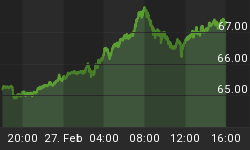Originally published August 25th, 2008.
Gold is believed to have bottomed. It crashed the support at $850 as predicted in the last update and plunged to hit a low $8 below our target range on a closing basis. Our target range for the drop was $800 - $825, and it bottomed at $792, with an intraday low at approximately $788. On the 1-year chart we can see how, although the drop took the price way below its 200-day moving average, and even below the 300-day, it now appears to be bottoming in the vicinity of the latter, and it is worth recalling that the most severe corrections during gold's bull market have ended near this average. It is interesting to observe how despite the decline taking the price somewhat below our target range, it ended exactly at a clear line of support that goes back to the November low at the bottom of a triangular consolidation pattern.

The time required for sentiment to recover after the recent battering is the reason why gold is not suddenly launching into a major advance, and instead appears to be marking out a small base pattern that at this point looks like it is evolving into a Head-and-Shoulders bottom, which we can clearly see on the 3-month gold chart. This pattern is forming beneath the line of resistance sandwiched between about $840 and $860 which was the former support level, and while this resistance will naturally impede this advance it could easily be swept aside if the dollar starts to accelerate to the downside again, which is hardly surprising as dollar strength has been a big factor behind the swoon in Precious Metals. If this is correct then gold is a buy on a minor reaction back to the $810 - $820 area to form a Right Shoulder to the pattern, which could occur in coming days.

The COT chart for gold is certainly looking encouraging at this time. While they would have to drop further to equal the level of August of last year,it is clear that the Commercials' short positions have dropped to their lowest level for a long time, which of course is normally a necessary precondition for a substantial rally.

The recent powerful rally in the dollar has comical overtones when one stops to consider that the intrinsic value of an individual dollar is approximately the same as a snowflake. This is easily the most debased and degraded currency in the developed world, and so the recent rally is inexplicable to many. Dollar bulls appear to have taken heart from the weakening of the Eurozone and there is a theory that heavy buying of dollars could be precipitated by a scramble to pay down debt ahead of massive rises in interest rates. Easy money has been around for so long that it is difficult for many now to imagine seriously high interest rates, so it would be interesting to see how the younger generation, for whom easy access to credit is viewed almost as a birthright, react if interest rates go through the roof. On the 1-year dollar chart we can see that it has followed through after its strong breakout clear above its 200-day moving average to reach the target zone we delineated in the last update, where the advance is running into trouble. While its continuing overbought condition, as shown by its MACD indicator at the bottom of the chart, combined with its proximity with its falling 300-day moving average, call for it to react back soon, we should keep in mind that the recent surge was the first time that the dollar has broken out upside from a significant trading range and clear above its 200-day moving average since 2005, so there is a fair chance that after due consolidation or reaction it will continue higher in a mini bullmarket of the kind that occurred in 2005. This, however, will not necessarily stop gold going up. It conspicuously failed to do so in 2005. There is an old saying that "In the land of the blind the one-eyed man is king", but sadly we can't even compare the dollar to the one-eyed man, which makes its recent strength all the more remarkable.
















